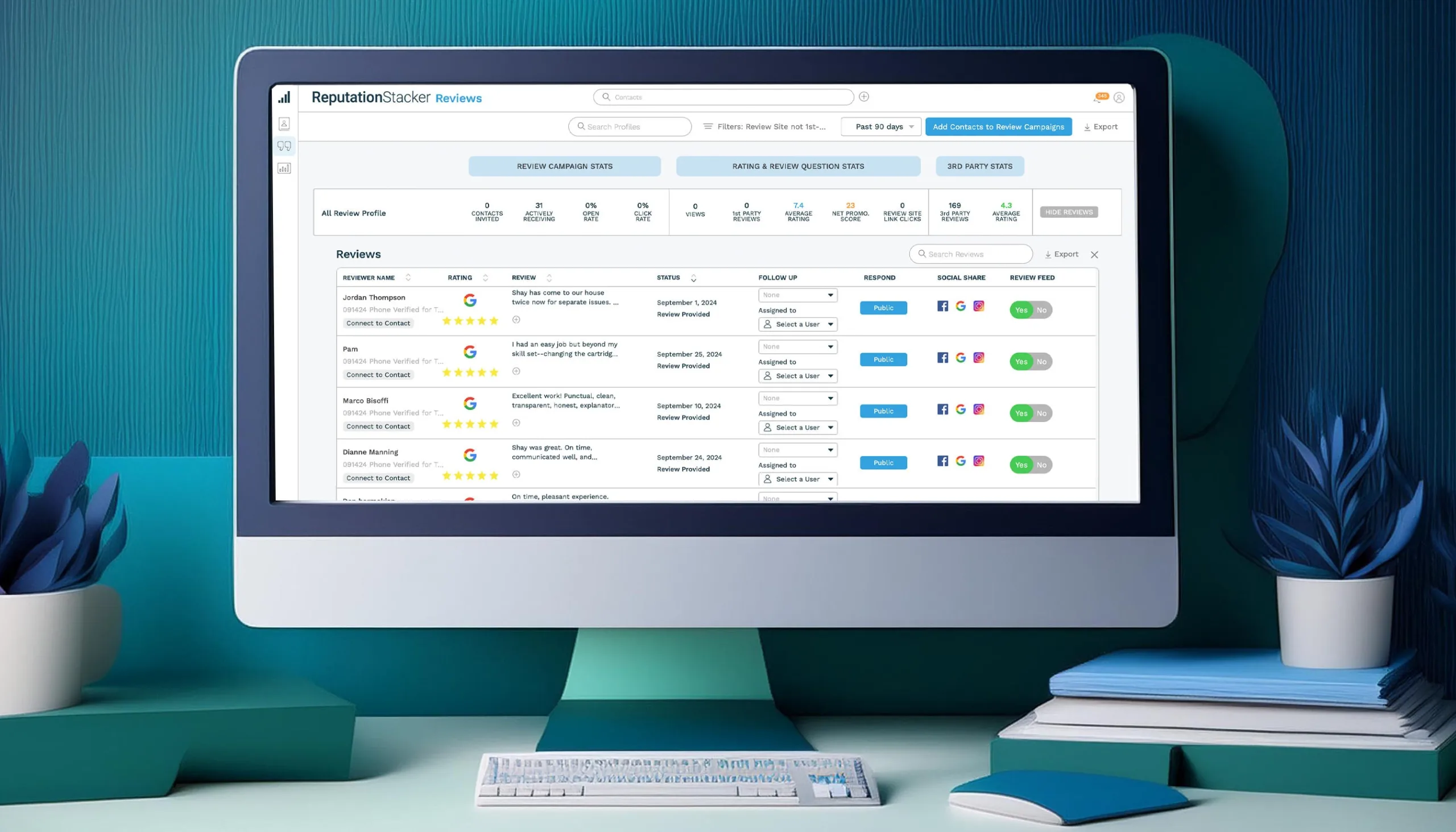The online marketplace is only getting more competitive, consumers are doing more research than ever before, and belief-driven buying is on the rise.
What does it all mean for businesses?
Ultimately, it has become difficult to stand out to consumers. Consumers aren’t fully sold by advertising anymore. What they’re looking for is businesses that share their values.
In other words, businesses that can be trusted.
Thankfully, there is a way to cut through the noise and stand out from the crowd, and that’s putting more work into your reputation online.
Whether through online reviews or social media, the internet has brought businesses and customers closer together.
And although increased online interaction with customers might sound like hard work, a good relationship will drive customer engagement and customer advocacy – two things that guarantee online success.
But to establish this kind of reciprocal relationship with customers, you need to get the ball rolling. So we’ve provided three steps that you need to start improving your reputation today.
But first, a little background…
Understanding Online Reputation Management

Your online reputation can make or break your business.
With consumers increasingly relying on online reviews and social media to make purchasing decisions, managing your reputation has never been more critical.
But what exactly is online reputation management, and why is it so essential?
What is Online Reputation Management?
Online Reputation Management (ORM) is the process of monitoring, managing, and influencing how people perceive a business or individual online.
It involves a combination of strategies to shape public perception, including review management, social media monitoring, and online community engagement.
Effective ORM helps businesses maintain a positive online image, increase consumer trust, and increase their online visibility.
By actively managing your reputation online, you can ensure that your business is seen in the best possible light, attracting more customers and driving growth.
Why is Reputation Management necessary?
Your reputation is your brand’s lifeline.
A strong reputation can significantly impact buying decisions, while negative reviews and online criticism can hurt your brand image.
This is why ORM is crucial for businesses to stay competitive and attract new customers.
Factors that contribute to Your Reputation Online

Several factors contribute to a business’s reputation, and understanding these elements is key to effective reputation management:
Review sites: Positive and negative reviews on platforms like Yelp, Facebook, Google, and industry-specific sites can significantly impact your reputation. Encouraging your customers to leave reviews can help build a strong online presence.
Social media: Social media channels offer a dynamic space for customer interaction. Engaging content, positive comments, and responsive customer service can contribute to a positive online reputation.
News coverage: Media mentions, press releases, and news articles can impact your online reputation. Proactive reputation management can help address any issues promptly and maintain a positive image.
Brand mentions and online forums: Industry forums, online communities, and blog comments provide valuable insights into customer sentiment. Monitoring these platforms can help you understand and manage your online reputation effectively.
Search engine results pages (SERPs): Search engine results can influence your online reputation. Implementing search engine optimization (SEO) strategies can help prioritize positive and accurate content, ensuring that potential customers see the best of your business.
Here’s the thing: Of all of the reputation management methods listed here, one has an outsized impact for how little work it requires, and that’s online reviews.
3 Steps For Improving Your Online Reputation Quickly
1. Work With Customer Feedback

How often does your business really listen to customer feedback?
Customer feedback surveys are one thing, but what your customers are saying on review sites and social media platforms is another.
All these forms of feedback are voluntary. But for the raw and more informative opinions of your customers, you need to look at their reviews.
In fact, real reputation management starts with tracking your online reviews.
It’s daunting, we know. But instead of turning a blind eye, you can get ahead of the competition by capitalizing on the valuable insights that your customers’ online feedback brings to the table.
The point is to work with customer feedback, not ignore it.
This includes both negative reviews and positive reviews, because knowing what your business is doing right is just as important as knowing what your business needs to do to improve.
But the big advantage of tracking your reviews on the most important review sites is that you can utilize them to show your customers that you are listening, valuing, and acting on what they have to say.
This level of attention, accountability, and transparency won’t go unnoticed by your customers, and will work wonders for your online reputation.
If tracking your online reviews sounds like a chore, that’s because it is. That’s why businesses who know how to leverage customer reviews to grow use reputation management tools like ReputationStacker (more on this later).
2. Start Responding To Negative Reviews

75% of businesses don’t respond to negative comments and reviews, according to a recent study.
The same study also showed that businesses that reply to at least 25% of their online reviews earn 35% more revenue on average.
What’s important to realize is that negative reviews aren’t just posted by customers to vent their frustration. Customers want their problems solved and more than half expect the business to respond quickly, so negative reviews are just as much a cry for help as they are an avenue to complain.
Due to this, all negative reviews are opportunities to show how much your business cares for its customers. And proactively showing you care will benefit your reputation in more than one way.
Responding professionally in a way that values the customer’s opinions can reduce the damage of a negative review.
Taking the time to fix the customer’s issue can even turn the customer into an advocate for your business, encouraging customer loyalty.
Review responses are also public, so how you respond and deal with customer issues will have a huge positive influence on how potential customers perceive your business – and customers, a whopping 96% of them, read review responses.
All in all, responding to reviews not only shows that your business takes responsibility, it also helps SEO.
Responding to reviews also demonstrates transparency and credibility – qualities that more and more modern-day consumers look for before using a business.
3. Encourage Customer Advocacy

What customers say about your business online is more valuable than you think. Their endorsements serve as powerful social proof – the hard evidence that your business delivers on its promises.
And by endorsing your business, your customers become your free online brand ambassadors.
Something to take note of here is that 88% of consumers trust online reviews written by other consumers as much as recommendations from people they know.
So it’s everyday customers who have a strong influence on other customers and what they choose to buy – more than influencer endorsements, business statements, or marketing campaigns.
After all, customers who write reviews have had first-hand experience and are speaking out on their own volition – making their opinions more trustworthy in the eyes of other consumers.
The big takeaway is that customer advocacy is essentially free online word-of-mouth marketing. It’s social proof that customers trust, so you need to make sure customers see it when they search for your business online.
You do this by collecting and marketing customer reviews.
Nine in ten consumers read reviews before buying, which makes managing reviews top of the list for improving your online reputation.
But how do you get your customers to write reviews?
By asking for them of course.
And just as with tracking and responding to reviews, reputation management software like ReputationStacker can help with the heavy lifting by automating the review request process for you.
Implementing a Proactive Approach

Taking a proactive approach to reputation management is essential for staying ahead of potential issues and maintaining a positive online image.
By setting clear goals and regularly monitoring your online presence, you can ensure that your business remains in control of its reputation.
Set goals for managing your online reputation
To effectively manage your online reputation, it’s essential to set clear goals and parameters.
Identify the metrics by which you’ll assess your progress, such as:
Generating new positive reviews on Google or Yelp
Increasing response time to online queries on social media platforms
Consistently improving your online reputation management strategy to increase sales and positive sentiment toward your brand
By setting specific goals, you can develop a proactive approach to reputation management and stay in control of your brand’s online image.
Regularly review your progress and adjust your strategies as needed to ensure continuous improvement.
This proactive approach will help you build a positive reputation that attracts and retains customers, ultimately driving business success.
Reviews Are The Building Blocks Of A Trustworthy Online Reputation

Look, we’re not knocking social media management or otherwise engaging with your customers and community online.
In fact, those things are foundational to a well-rounded reputation management strategy.
It’s just that given limited time and resources, you’re going to make the biggest impact with the smallest effort by getting more reviews from your customers on a consistent basis.
Reviews play a massive role in online reputation management – something you probably noticed while reading the above.
Reviews don’t just help your business to improve – they help potential customers learn more about your products or services, and, ultimately, whether or not they can trust your business.
Reviews are the key to building a trustworthy online reputation.
Consumers need to trust businesses before they engage with them, which means businesses need to get more reviews to increase consumer trust.
The problem is getting reviews. No matter the size of your business, you’ll already know that it’s easier said than done, because even go-to strategies, like directly asking every customer for a review, often fail to deliver adequate results.
There is a solution, however, and it’s also the easiest step there is for improving your online reputation.
The Fastest Way To Improve Your Online Reputation

Improving your online reputation easily might sound too good to be true, but ReputationStacker is a tool that makes it possible.
How?
It’s simple: ReputationStacker automates the entire review request process for businesses, using an effective communication funnel that encourages customers to write reviews.
ReputationStacker works for all different review sites and for businesses of all sizes. It can even embed reviews on your website, as well as send reminders to your customers who forget to post a review.
Your business needs reviews to build an online reputation consumer will trust.
Instead of waiting for reviews or putting your effort into a time-intensive strategy, it’s far quicker and easier to let ReputationStacker do the hard work for you.
In Summary

There are several steps you can take to improve your online reputation.
First, monitor your online presence to identify any potential issues or negative content that may be affecting your reputation.
Next, address any negative feedback or reviews directly and professionally, and strive to provide excellent customer service to prevent future negative reviews.
You can also encourage your customers to leave reviews, which will help to improve your overall online reputation.
Finally, consider using a reputation management company like ReputationStacker to help you manage and improve your online reputation.
Frequently Asked Questions About How To Improve Online Reputation
How can positive reviews impact my business?
Positive reviews can improve your brand’s reputation, attract new customers, and boost sales by building trust.
How does reputation management help my business?
Reputation management helps improve public perception, addresses negative feedback, and fosters a positive brand image, ultimately leading to increased customer loyalty.
How can I encourage satisfied customers to write reviews?
You can encourage satisfied customers to write reviews by asking for feedback directly, offering incentives, or simplifying the review process through follow-up emails. Note that many review sites and the FTC prohibit review gating, which is why we encourage you to ask all of your customers for reviews, not just happy customers.
How should I handle negative comments on social media?
Address negative comments promptly and professionally, acknowledging customer concerns and offering solutions to resolve issues.
What’s the best way to create an online review strategy?
Develop a strategy by identifying your target audience, encouraging customers to write online reviews, and regularly monitoring feedback across online platforms. Review management software like ReputationStacker can automate the process for you.
How can I address negative feedback effectively?
Addressing negative feedback involves acknowledging the issue, providing a solution, and demonstrating your commitment to customer satisfaction.
Why is brand perception important in reputation management?
Brand perception affects customer trust and loyalty, influencing their decision to choose your business over competitors.
How can I improve my brand’s reputation using social media?
Use social media to engage with customers, share positive news, respond to inquiries, and promote positive relationships with your audience.
What should I do about unfavorable reviews?
Respond professionally, thank the reviewer for their feedback, and offer to resolve any issues to demonstrate your commitment to customer satisfaction.

How can I leverage my social media accounts to boost my reputation?
Share positive customer stories, engage in conversations, and promote your products to build a strong and favorable online presence.
What role does public relations play in reputation management?
Using reputation management strategies in public relations helps shape your brand’s narrative, manage crises, and promote positive news to improve your reputation.
How can I encourage brand advocacy among loyal customers?
Engage loyal customers through exclusive offers, social media shout-outs, and requests to share their experiences, turning them into brand advocates.
What impact do bad reviews have on my business’s reputation?
Bad reviews can deter customers and harm your reputation, making it essential to address them swiftly and effectively.
How can I ensure customer satisfaction to boost my reputation?
Focus on improving the customer experience by providing quality products/services, responsive support, and actively seeking feedback for continuous improvement.
What is the relationship between digital marketing and reputation management?
In many ways, online reputation management is a sub-function of digital marketing. Digital marketing strategies, such as content marketing and social media engagement, can improve your brand’s online presence and reputation.

